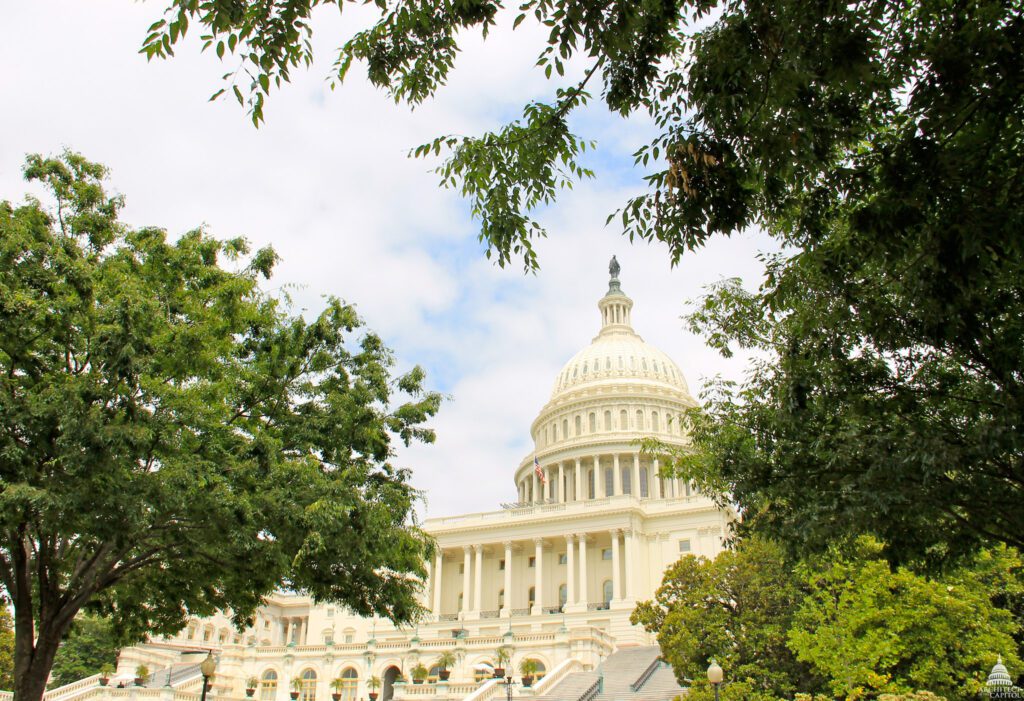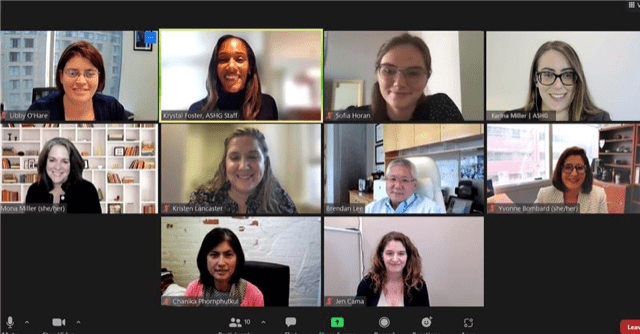 On May 11, 2022, ASHG hosted its second (virtual) Capitol Hill Day. This event brought together 21 Society members from the ASHG Board of Directors, the Government and Public Advocacy Committee (GPAC), and trainee advocates from the Advocacy Certificate for Human Genetics and Genomics Trainees (ACGT) program. During this year’s event, Hill Day participants met with congressional offices with key roles in determining the National Institutes of Health (NIH)’s policy directions, programming, and annual budget. ASHG advocates shared the value and progress of human genetics and genomics research and called upon members of Congress to support robust funding for NIH, efforts to diversify participation in human genetics research, and responsible, broad data-sharing.
On May 11, 2022, ASHG hosted its second (virtual) Capitol Hill Day. This event brought together 21 Society members from the ASHG Board of Directors, the Government and Public Advocacy Committee (GPAC), and trainee advocates from the Advocacy Certificate for Human Genetics and Genomics Trainees (ACGT) program. During this year’s event, Hill Day participants met with congressional offices with key roles in determining the National Institutes of Health (NIH)’s policy directions, programming, and annual budget. ASHG advocates shared the value and progress of human genetics and genomics research and called upon members of Congress to support robust funding for NIH, efforts to diversify participation in human genetics research, and responsible, broad data-sharing.
Lynn Jorde, PhD, GPAC Chair, noted the importance of scientists communicating to policymakers. “Scientists as advocates bring expertise in evidence-based decision making and, by reaching out to policymakers, we can help influence them to pursue policies that advance biomedical science and the appropriate application of genetics in health and society.” Cynthia Morton, PhD, Incoming GPAC Chair, added, “As scientists, we need to continue to engage with Congress if we want federal policies that are pro-science. Scientists should care about advocacy because, without it, essential problems might never receive the attention they rightfully deserve.”
Member advocates shared their testimony with congressional offices on how advances in human genetics and genomics research are enabling new insights into preventing, diagnosing, and treating disease and saving lives. Kristen Lancaster, MD, an ACGT trainee member, said, “The use of cutting-edge genetic technology made it possible to obtain sequencing results (in a matter of days) for a very sick baby in the neonatal ICU with a suspected genetic condition. Doctors could rapidly identify the genetic condition and a treatment so this baby could go home to his parents.” Sofia Horan, also an ACGT trainee member, added an example from her training as a genetic counselor. “Advances in genetics research have allowed us to discover more and more about genes and the role they play in diseases like cancer. As a result of this increased knowledge, the daughters in a family could test for a gene mutation which increases their risk of developing breast cancer – a disease which claimed their mother young. They could begin screenings early and consider preventative surgeries before developing cancer. This is just one example of how genetic research is saving lives.”

ASHG advocates also communicated to Congress the importance of diversity in research cohorts and emphasized that if diversity has not been considered before reaching the clinical trial stage, the conclusions are inherently biased. Society members called attention to All of Us, a precision medicine research program at NIH which seeks to recruit 1 million Americans from all backgrounds to build one of the most diverse genetic databases in history. All of Us shared a program announcement earlier this spring, highlighting the release of its initial genomic dataset. ACGT trainee John Morris, PhD, added that, “The superpower of the U.S. is our diversity; the NIH All of Us research program can help us uncover novel disease treatments to benefit everyone.”
ASHG members also spoke with congressional offices regarding how the broad sharing of genomics information has empowered scientific discovery, and the leadership of the genetics community in developing best practices for sharing data while protecting research participants’ privacy. Congress has become increasingly interested in the potential national security risks from the sharing of individuals’ health information generated through NIH-funded research. Advocates emphasized the privacy protections already in place and the need to ensure continued broad data-sharing to fuel scientific progress.
Also on May 11, ASHG President Elect Brendan Lee, MD, PhD, submitted written testimony to Congress on behalf of the Society, urging the U.S. Congress to provide $49 billion for NIH’s base budget in Fiscal Year (FY) 2023, with any additional funding for the newly established Advanced Research Projects Agency for Health (ARPA-H) to supplement, not supplant, the core investments in the NIH base budget. This is consistent with the research community’s FY 2023 funding level recommendations.
ASHG’s Capitol Hill Day was organized by the GPAC as part of the Board-approved Action Plan. As a GPAC-led initiative, Hill Day participation is a key feature of the ACGT program.
Add your voice – consider becoming an ASHG Advocate!
